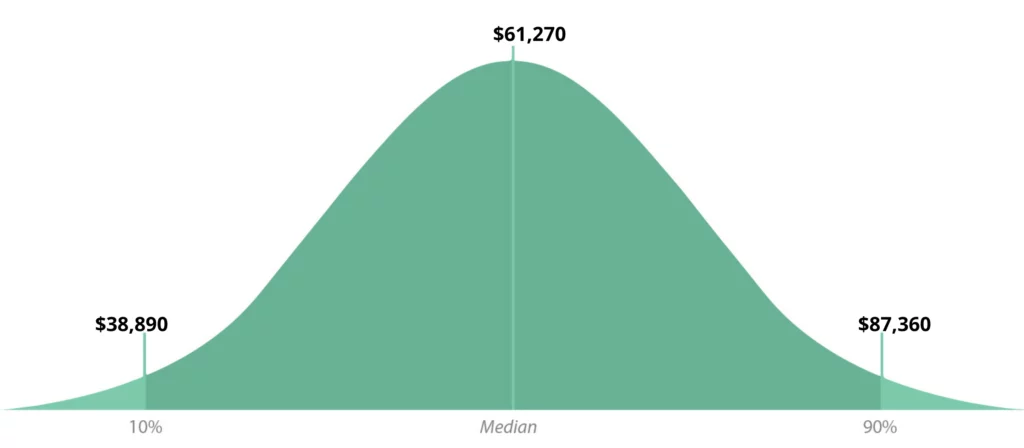
1. Overview: Job Responsibilities, Salary, and Common Requirements
2. A Comprehensive Guide to Becoming a Dietitian and Nutritionist
3. What Does a Dietitian and Nutritionist Do?
4. Signs You Should Consider Becoming a Dietitian and Nutritionist
5. How Do You Become a Dietitian and Nutritionist?
6. What are the Knowledge and Skills Needed to be a Dietitian and Nutritionist?
7. Popular Schools and Colleges in the U.S. for Aspiring Dietitians and Nutritionists
8. How to Get a Job as a Dietitian and Nutritionist
9. Learn About Geographic and Location Pay Differentials
10. Make Your Resume Stand Out
11. Ace Your Dietitian and Nutritionist Interview
12. Top Online Courses for Aspiring Dietitians and Nutritionists
The following are some of the things you can find under a Dietitian and Nutritionist job description:
Dietitian and nutritionists made a median salary of $61,270 in 2019. The best-paid 10 percent made $87,360 that year, while the lowest paid 10 percent made $38,890.

Health Educators
Community Health Workers
Registered Nurses
Rehabilitation Councilors
Dietetic Technicians
Food Safety Auditor
Nutrition Services Manager
Food Labeling Specialist
Medical Scientists
Naturopathic Physicians
Corporate Wellness Consultants
Fitness Instructors
Food Product Development Scientists
Interpersonal Skills
Computer Literacy
Research Translation
Organizational Skills
Fundamental Psychology
Cooking
Coaching and Motivation
Food and nutrition play a vital part in anybody’s life, especially to persons with health issues or those aiming to achieve a healthier lifestyle. It is no wonder that in order to become someone who helps people in this area, there are several rigorous prerequisites that you need to accomplish. A dietitian and nutritionist needs to be knowledgeable and skillful enough to formulate and implement plans relating to a person’s nutrition and diet.
The main goal of a dietitian and nutritionist is to help promote their clients’ health and control disease. They do this by carefully plotting and implementing nutritional programs that are based on the diet needs that have been identified during a patient’s health assessment.
Here is a more detailed Dietitian and Nutritionist job description:
There are certain traits and characteristics that one must possess in order to become a successful dietitian and nutritionist. Some of these characteristics are naturally occurring, while others may take time and practice to develop. Here are a few tell-tale signs that being a dietitian and nutritionist is the right career path for you:
Being in this profession means that you have to sit through numerous consultations with clients and their families. Having good listening skills is essential because you have to be keen on understanding a person’s nutritional needs and their diet goals, which may differ from person to person. Your clients should also feel that their concerns are being heard so that they feel more comfortable and confident in confiding with you.
Being a good listener also enables you to work seamlessly with other members of the healthcare team, managing a patient’s case. You will be able to listen to considerations brought up by other team members concerning a patient’s diet in relation to their medical needs, and thus be able to come up with the best possible diet plan for the patient.
When discussing dietary issues, some clients may become emotional, especially if it is something that they have been struggling with for a long time. They might also likely be dealing with a particularly difficult medical condition that merited the need for nutritional intervention. Knowing that there may be some emotions involved while conducting counseling sessions, a sense of compassion and some care and empathy should be practiced.
The first part of your job involves assessing the current state of your patient’s nutrition. It is at this point of the job that you have to employ some problem-solving skills by first being able to identify the challenges that your patient needs help in order to address it.
After the initial assessment and after identifying what needs to be improved in the patient’s diet, you will have to find or formulate counter-measures to tackle it. This part is where your problem-solving skills come fully into play, and it doesn’t stop after the planning phase. Part of the problems or challenges you need to confront is how to ensure that your client sees through the diet plan.
This is probably the most prominent characteristic that a dietitian and nutritionist should have. Although you have a good theoretical grasp on what should be an ideal diet for your patients, you should be well-attuned to the process that converts your diet plans into actual meals on their tables.
The whole process should trace back from the market to food preparation, from cooking to serving–and even storage. If you are knowledgeable and passionate about food, you are likely going to be more effective in your role because you know the ins and outs of food and all the work that goes into producing it. You will be able to give better suggestions and formulate meal plans which are realistic and attainable for your clients.
Apart from formulating analyses and creating meal plans, much of your work will involve communication with patients, their families, other members of the healthcare team, and fellow dietitian nutritionists. On top of that, you will also be speaking for groups and organizations about how diet and nutrition play a vital role in sustaining good health and controlling certain medical conditions.
Below are a few tips you can employ in order to communicate with clients effectively:

If you think you possess all the natural qualities that would make you a good dietitian and nutritionist after browsing through our Dietitian and Nutritionist job description, here is how you can officially become one:
Typically, dietitians and nutritionists have completed a degree in dietetics, foods and nutrition, clinical nutrition, public health nutrition, food service system management, or any related program. Basically, any program that offers courses on psychology, chemistry, biology, and nutrition are most recommended.
Once you have completed your bachelor’s, it is generally recommended to seek a more advanced degree because many dietitians and nutritionists are graduate degree holders. Securing higher education and continuing learning after college will put you at par or possibly give you an edge over other competing applicants.
This type of job will require you first to undergo hundreds of hours worth of supervised training. You can avail of this training through an internship that you can apply to after graduation. However, you can check ahead if your school offers supervised training as part of its curriculum, as this can help you get licensed and get to the job faster. To be able to become a Registered Dietitian and Nutritionist (RDN), you will have to complete 1,200 hours worth of dietetic internship on top of your bachelor’s degree.
Although there are a few states that are quite lenient (Michigan, New Jersey, and Arizona), most institutions require their dietitians and nutritionists to have an RDN credential or a state license at the very least. The Academy of Nutrition and Dietetics–through their crediting agency, the Commission on Dietetic Registration–administers the RDNs. To maintain the RDN status, the professional who has acquired it needs to attain 75 continuing professional education credits every five years.
The Board of Certification for Nutrition Specialists also offers the Certified Nutrition Specialist (CNS) credential, which is a higher form of credential that certifies that a nutritionist possesses an advanced level of knowledge. In order to obtain this certification, you need to complete at least a master’s degree in nutrition, undergo one thousand hours of supervised training, and pass an exam. To maintain CNS status, you should also attain 75 continuing professional education credits every five years.
Aside from the RDN credential, the Commission on Dietetic Registration also offers accreditation for RDNs who wish to specialize in a specific field for a more specialized career path. Below are a few examples you might be interested in:
Dietitians and nutritionists are not only well-educated professionals–they also possess high levels of skills and knowledge that come in very handy when doing their jobs. Their expertise is not only limited to what their degree program has taught them in theory because they have also acquired enough experience and skill to become as effective as they can be in their role. Below are some of these crucial skills and knowledge:
One important item in the Dietitian and Nutritionist job description is meal planning. In order to empathically relate to your patients and effectively convey your nutritional plans, you need to have at least a fundamental understanding of the process of food preparation. Knowing how to shop for the right food correctly, how to prepare it at home, and how to make the proper serving portions helps you explain and even demonstrate how they can execute your meal plans.
While this skill may come naturally to others, it can also be developed through conscious and consistent practice. The importance of developing active listening skills is paramount in this type of profession where you will be counseling with patients. You will need to gather as much accurate data as possible to formulate a nutritional plan that is realistic and attainable for your client.
Since you will be dealing with people on a one-to-one basis, you will need a fair amount of background in psychology. The Center for Nutritional Psychology states that nutrition plays a vital role in a person’s mental health, just as much as a person’s psychological state determines his or her food choices. On top of that, the act of dealing with a client on a matter as personal as their daily food choices means that you should come prepared to also deal with how they are going to react through the course of your conversation.
Another yet important skill that a dietitian and nutritionist must possess is the skill of teaching. You should be able to convey information in such a way that your clients retain it and confidently apply it to their daily living. You can look up health teaching strategies that will ensure that your diet plans are not just polished, but more importantly, carried out effectively enough to make a positive impact on your patient’s health.
Just like in the field of medicine, there are numerous advances and updates on information and practices when it comes to diet and nutrition. You can check out credible sources such as the World Health Organization’s nutrition page or directly from the Academy of Nutrition and Dietetics for the latest information that you can apply to your practice.
Below are some of the best schools and colleges we could find for aspiring dietitians and nutritionists in the US:

The current job outlook for dietitians and nutritionists is quite positive and growing faster than average at 8%. With that, it is probably safe to say that given the right skills and credentials, you will be able to find and bag a job quickly. Here are three things you can try out to get that job:
Having the Academy of Nutrition and Dietetics credential and becoming part of it means that you automatically have a networking community of other dietitians and nutritionists to back you up. Their official website features a “Find an Expert” application, which allows patients or clients to seek out registered dietitians and nutritionists within their locality actively. The feature makes RDNs more accessible to the public and can earn them private clients in the form of individuals or organizations and institutions that are looking to hire.
Chances are, you may not even need to look far and wide to be able to find a place that is in need of a dietitian and nutritionist. Your dream job could just be waiting for you around the next corner, literally. The best place to look for dietitian and nutritionist jobs are at the following sites:
If you want a more modern approach to finding a job, you may easily look for opportunities online. You can actively look for employment in trusted job-posting websites and put up a profile with your resume so that potential employees can easily spot you and check out your skills and credentials.
Dietitians and nutritionists earn an average of $61,270 in a year. It varies greatly depending on the field they work in, their specialization, and their location. Here is a list of annual pay differentials for these professionals across all states:
| State | 2019 Mean Annual Wage |
|---|---|
| California | $ 77,040 |
| Alaska | $ 72,640 |
| Massachusetts | $ 72,610 |
| Hawaii | $ 71,230 |
| New Jersey | $ 70,550 |
| Oregon | $ 70,170 |
| New York | $ 68,590 |
| Maryland | $ 68,550 |
| Connecticut | $ 68,350 |
| Delaware | $ 65,060 |
| Washington | $ 64,770 |
| Minnesota | $ 63,710 |
| Nevada | $ 62,940 |
| Florida | $ 62,530 |
| Rhode Island | $ 62,320 |
| Vermont | $ 61,630 |
| New Hampshire | $ 61,320 |
| Colorado | $ 61,080 |
| Maine | $ 60,640 |
| Oklahoma | $ 59,970 |
| Virginia | $ 59,790 |
| Arkansas | $ 59,450 |
| West Virginia | $ 59,170 |
| Illinois | $ 59,160 |
| Pennsylvania | $ 59,160 |
| State | 2019 Mean Annual Wage |
|---|---|
| Wyoming | $ 59,040 |
| North Dakota | $ 58,840 |
| Ohio | $ 58,700 |
| Utah | $ 58,450 |
| New Mexico | $ 58,440 |
| Kentucky | $ 57,970 |
| Kansas | $ 57,930 |
| Missouri | $ 57,590 |
| Wisconsin | $ 57,060 |
| Texas | $ 57,030 |
| Indiana | $ 56,860 |
| Arizona | $ 56,850 |
| North Carolina | $ 56,830 |
| Louisiana | $ 56,740 |
| South Carolina | $ 56,650 |
| Michigan | $ 56,070 |
| Alabama | $ 56,050 |
| South Dakota | $ 55,270 |
| Tennessee | $ 55,270 |
| Nebraska | $ 54,940 |
| Montana | $ 52,030 |
| Iowa | $ 52,000 |
| Idaho | $ 51,050 |
| Georgia | $ 50,580 |
| Mississippi | $ 50,530 |
Report from the Bureau of Labor Statistics
Below are the things you could include in your dietitian and nutritionist resume to get you noticed:
This portion of your resume should summarize your qualifications, experience, and why you wish to apply–basically everything you want potential employers to know to consider you for the position at first glance.
Take note of the skills which are most important for the role and emphasize them in your resume. Skills like active listening, relationship-building, communication, time management, and decision making all make you stand out as a candidate for the position. Your entries in this section should mostly be based on the Dietitian and Nutritionist job description.
It is important to emphasize your most relevant educational attainments because this is the fundamental qualification that an employer looks for in this profession.
If you have not had that much experience in the field of dietetics and nutrition, you can include other relevant experience like customer service in health-related settings such as fitness clubs or health food stores. Also, if you have had some experience in clinics and food establishments, it could come in handy in this portion as well. Any volunteer experience, such as taking part in soup kitchens, can also be applied.
Feature any of your state certification, RDN, CNS, or any nutrition and diet workshops you may have attended. Make sure that you have these well-documented with copies of your certificates and merits. For many locations, you may be required at least state certification to get the job.
Listing down relevant hobbies and interests can also be to your advantage. For example, if you are into sports and fitness, you will have a better chance to bag a job as a sports nutritionist. Also, stating an interest in the kitchen would be an added bonus.
When they finally call you back for an interview, there are a few things you can review to prepare for your encounter with the hiring manager. Here are a few things you can think of ahead to get ready:
Get to the root of how you began having an interest in the field. Try and enumerate what motivates you the most in this line of work. Having a heart for the job makes a very solid foundation for it, and this will show your employer that you are willing to go above and beyond in the performance of your tasks.
Difficult patients include those who are stubborn, illiterate, or non-compliant. If you have had such an experience in the past, describe how you were able to overcome it. If not, tell the interviewer how you plan to handle such cases so that it will bear a positive outcome.
Make sure you describe an experience that is relevant to the job. It could be helping someone attain a healthy weight, minimizing someone’s illness-related symptoms, or simply helping someone make better food choices at a specific time.
Recall how the problem started, the actions you have taken to address it, and how you resolved it in the end. Show your potential employer that you are good at dealing with difficult situations and that you have excellent interpersonal relationship skills.
Your interviewer might ask this as it is, but most of the time, you will be given a scenario for which you can expect to handle hypothetically. For example, they could give you the task to create a week’s meal plan for an elderly hypertensive woman or a child with juvenile diabetes.
For this type of question, it would be helpful if you did some background research on the company itself. Having some knowledge about the company may impress the hiring manager as it shows how interested you are in their company. Take note of their company mission and how you can tie that in with your personal and professional goals.
Sharpen your dietetics and nutrition in marketing by taking these top online courses
If you are interested in getting into this career, below are a few top courses that you can check out to increase your knowledge and improve your skills in dietetics and nutrition:






